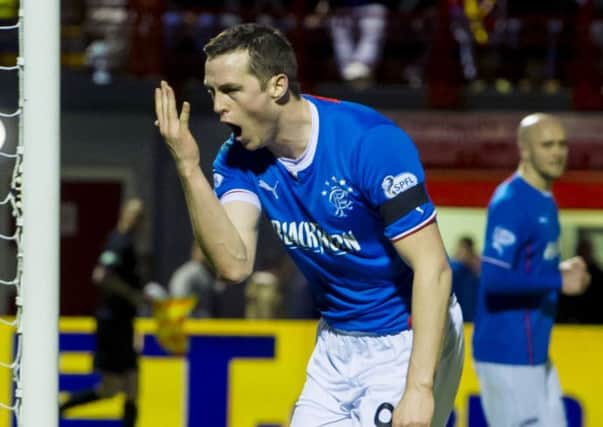SFA clarify Dundee United Ibrox ticket allocation


United, who had criticised the SFA repeatedly for not allowing them to play Rangers at a neutral venue in the 12 April last-four clash, and for apparently discriminating against them in terms of the ticketing split, saw their stance undermined when the SFA issued a press release detailing the events of a “pre-operations meeting” on 11 March.
The association claimed that, far from United demanding an even split of the 51,082 seats available at Ibrox, or even a figure of 20,000 mooted elsewhere, the “official present” at the meeting indicated that the SFA’s initial offer of 11,063 – including the entire Broomloan Stand – would exceed demand.
Advertisement
Hide AdAdvertisement
Hide AdContinuing to identify the United official as the cause for the dispute that has followed, the statement continued: “He was invited to revert to the club for confirmation but declined. Notwithstanding the present allocation of 8,012 – as requested by the club – Dundee United retain first option on the Govan West corner, and a section of the Front and Rear, an additional 3,051 seats.
“Should the club a) request that additional allocation and b) sell it, then there remains the opportunity to extend the allocation subject to agreement between the clubs and the relevant police and stewarding advice.”
In other words, as of yesterday the SFA had still reserved 11,063 for United fans with the possibility of more being granted. And, when asked by The Scotsman
last night how many United fans he reasonably expected would buy tickets for this fixture, chairman Stephen Thompson predicted a figure between 12,000 and 14,000.
However, Thompson was far from placated. He said that United had been represented at the meeting by assistant company secretary Nigel Smith and head of security Ian Low, both of whom had angrily contradicted the version of events told by the SFA yesterday.
Admitting that the stand-off had descended into “farce”, Thompson complained that his club had never been “treated as an equal” since the prospect of Rangers being their semi-final opponents emerged when the draw was made on 9 March.
Thompson said: “We’re very, very unhappy as a club, first of all because of the tone of the statement, which is very, very economical with the truth about what happened at the meeting.
“We never said at any point that we only wanted 8,000 tickets, and to talk about previous semi-finals is irrelevant,” he added, referring to the SFA’s public reminder that United sold only 6,783 for last year’s semi-final against Celtic, and 9,969 for the 2010 semi-final against Raith, in both instances failing by some distance to meet their allocation.
Advertisement
Hide AdAdvertisement
Hide Ad“The whole point is a point of principle concerning a match taking place at a neutral venue. The club has never been treated as an equal in this process and that’s the point. My letter to the SFA [in which he asked for a neutral venue to be named] was about integrity and neutrality and it was totally disregarded. It has become a farce. The SFA are trying to deflect away from the mistake of a non-neutral venue in the first place.
“We will not need 20,000 tickets. I reckon 12,000 to 14,000 will probably be more accurate. But if we wanted 20,000, we should have been offered 20,000. It’s the way it was handled.
“We were dictated to from the start, and the SFA were more interested in looking after their commercial sponsors than neutrality and sporting integrity.”
Thompson said that both Smith and Low were “absolutely livid” to read yesterday’s SFA press release, which appeared to implicate one of them in making the club hierarchy look ill-informed in the subsequent debate.
Thompson made an official request to the SFA last week that the semi-final be switched to a neutral venue in the event of Rangers winning their quarter-final replay against Albion Rovers. That request was declined, on the basis that neither United nor any other member club had registered a protest about any allocated Scottish Cup venues when they were first confirmed.
United manager Jackie McNamara then added fuel to the fire by claiming his club should be offered half of the 12 April semi-final ticket allocation on the basis that he would “like to think we could take half... We’ve had good backing from the fans”.
Alan Stubbs, meanwhile, urged McNamara yesterday to forget about the venue dispute and trust in his team to prove they are superior to Rangers in any stadium. Stubbs played for Celtic against Rangers the last time a Scottish Cup semi-final took place in the home ground of one of the competing sides. That was April 1998, and Celtic Park had been chosen as the venue after a coin toss (Hampden was being redeveloped). The pre-match talk about Celtic, for whom McNamara was missing through injury, holding an advantage was rendered irrelevant when goals from Ally McCoist and Jorg Albertz gave Walter Smith’s team a decisive lead, reduced late on by Craig Burley.
Everton coach Stubbs, speaking yesterday at the John Hartson Foundation golf day at The Carrick on Loch Lomond, said: “I think when you are playing semi-finals it’s like it’s neutral ground. I think with the way Jackie’s team is playing at the moment, and the way he is going, all he needs to do is focus on his team. And he will be confident, whichever ground it is going to be, that he can beat Rangers on that day. ”